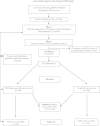The STRIDE (Strategies to Increase confidence, InDependence and Energy) study: cognitive behavioural therapy-based intervention to reduce fear of falling in older fallers living in the community - study protocol for a randomised controlled trial
- PMID: 24906406
- PMCID: PMC4059076
- DOI: 10.1186/1745-6215-15-210
The STRIDE (Strategies to Increase confidence, InDependence and Energy) study: cognitive behavioural therapy-based intervention to reduce fear of falling in older fallers living in the community - study protocol for a randomised controlled trial
Abstract
Background: Around 30% to 62% of older individuals fall each year, with adverse consequences of falls being by no means limited to physical injury and escalating levels of dependence. Many older individuals suffer from a variety of adverse psychosocial difficulties related to falling including fear, anxiety, loss of confidence and subsequent increasing activity avoidance, social isolation and frailty. Such 'fear of falling' is common and disabling, but definitive studies examining the effective management of the syndrome are lacking. Cognitive behavioural therapy has been trialed with some success in a group setting, but there is no adequately powered randomised controlled study of an individually based cognitive behavioural therapy intervention, and none using non-mental health professionals to deliver the intervention.
Methods/design: We are conducting a two-phase study examining the role of individual cognitive behavioural therapy delivered by healthcare assistants in improving fear of falling in older adults. In Phase I, the intervention was developed and taught to healthcare assistants, while Phase II is the pragmatic randomised controlled study examining the efficacy of the intervention in improving fear of falling in community-dwelling elders attending falls services. A qualitative process evaluation study informed by Normalization Process Theory is being conducted throughout to examine the potential promoters and inhibitors of introducing such an intervention into routine clinical practice, while a health economic sub-study running alongside the trial is examining the costs and benefits of such an approach to the wider health economy.
Trial registration: Current Controlled Trials ISRCTN78396615.
Figures
References
-
- Painter JA, Elliott SJ, Hudson S. Falls in community-dwelling adults aged 50 years and older: prevalence and contributing factors. J Allied Health. 2009;38:201–207. - PubMed
Publication types
MeSH terms
Associated data
LinkOut - more resources
Full Text Sources
Other Literature Sources
Medical


